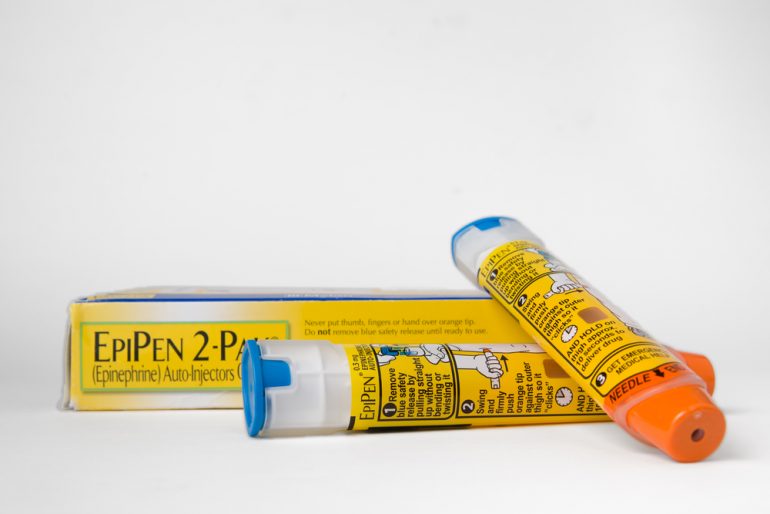BALTIMORE – With EpiPens and other prescription drugs rising in cost, families who desperately need them but do not have health insurance are bearing a huge financial burden, according to community advocates.
The Maryland Citizens’ Health Initiative, a coalition of more than 1,200 religious, labor, business and policy groups seeking quality and affordable health care, wants the state legislature to address that financial burden by overhauling some of the laws governing drug pricing.
“The problem is when prices are raised so high, it’s really hard on families with children who need access to life-saving medications to budget to get these medications that they really need,” said Anna Davis, the health policy director for Advocates for Children and Youth.
The health initiative recently released the results of a poll of 802 Maryland registered voters that showed an overwhelming 80 percent supporting three key actions to combat high drug costs – and all three are to be incorporated in proposed legislation.
The healthcare advocates want to require companies to disclose the price basis (how much they spend on production, research, advertising, and profit) of their drugs, require companies to notify the public of an increase in price of a drug, and authorize the state’s attorney general to take legal action to prevent unfair price hikes.
In the next couple of months, the group will announce a bill and sponsors for these proposals, said Vincent DeMarco, president of the Maryland Citizens’ Health Initiative. The Maryland General Assembly’s session is scheduled to begin in January.
The Pharmaceutical Research and Manufacturers of America did not respond to a request for comment for this story, but spokeswoman Caitlin Carroll told the Washington Post that her organization would like to work with advocates to provide accessible information on the out-of-pocket cost for drugs.
Regarding legislative efforts to make public how drug companies set prices, Carroll said: “Legislation like this doesn’t help patients to actually afford the medications they need.”
An Intercontinental Marketing Services health study conducted this year found that consumers spent a total of $310 billion on medications in 2015, which is 8.5 percent higher than 2014.
“People are in danger and their lives are in danger because they can’t afford the prescription drugs they need,” DeMarco said. “We need these life-saving prescription drugs to be affordable and available to people.”
On the federal level, members of Congress have pressed drug manufacturers to explain dramatic price hikes in pharmaceuticals but so far have not found bipartisan consensus on possible legislative action.
At a Sept. 21 hearing of the House Oversight and Government Reform Committee, Heather Bresch, CEO of EpiPen maker Mylan, Inc., defended her company’s decision to raise prices by 400 percent since 2007. She said her company is making only about $50 per EpiPen. Her company now is offering a generic version at $300 and is improving public access to the device.
“I wish we had better anticipated the magnitude and acceleration of the rising financial issues for a growing minority of patients who may have ended up paying the full wholesale acquisition cost or more,” she said. “We never intended this.”
That did not comfort lawmakers.
“I find this to be so extreme…it is driving exorbitant profits,” said Rep. Jason Chaffetz, R-Calif., panel chairman.
Rep. Elijah Cummings, D-Baltimore, ripped into Mylan for boosting the EpiPen’s price “for no discernible reason.” The committee, he said, obtained documents showing that net sales revenue from EpiPens in 2008 was $184 million; this year that figure will be $1.1 billion.
“They raised the prices, I believe, to get filthy rich at the expense of our constituents,” the congressman said.
Having been personally affected by the prescription drug price hikes, Baltimore resident Barbara Gruber, 58, said she would feel more comfortable and healthier if she could buy prescription drugs for her asthma when she needed them.
“It’s a choice between eating, living, and getting the drugs that will keep me alive,” said Gruber, an adjunct professor at various universities in Baltimore city.
Without her prescription drugs, she would not be able to enjoy her hobby, which is painting, Gruber said.
“I can live without an extra paintbrush, I can live without that tube of Indian yellow that I love so much, but I can’t live without certain drugs that I take,” she said. “If the drugs go out of my price range, I can die.”
The Maryland Pharmacists Association would not comment on the three initiatives until advocates introduce them, Executive Director Aliyah Horton said.
“The Maryland Pharmacist Association supports efforts to limit unjustified or unreasonable pricing by pharmaceutical companies that may affect the affordability of medications for patients,” she said.

